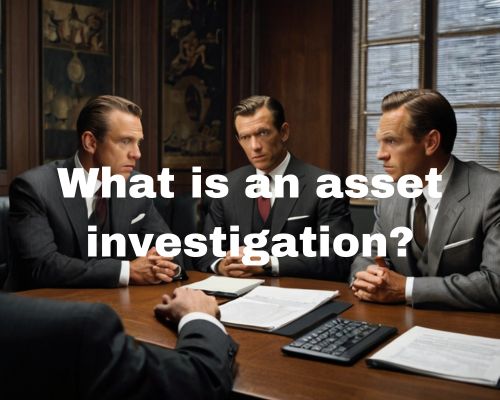In a world where financial transparency is paramount, asset investigations serve as a crucial tool.
An asset investigation is a process that uncovers both tangible and intangible assets owned by individuals or businesses.

You might be surprised at how often these investigations are necessary, whether it’s for recovering debt, resolving legal disputes, or simply understanding someone’s financial standing.
You may need an asset investigation when assessing the financial trustworthiness of a potential business partner or investor.
It helps reveal details like hidden assets, fictitious identities, and even fraudulent activities, often using methods like scrutinizing real estate deeds, bankruptcy filings, and financial records.
This level of financial investigation can offer peace of mind or uncover complexities that could otherwise go unnoticed.
Private investigators like Charles Jimerson from Private Investigator West Palm Beach, frequently conduct these inquiries due to their expertise in financial and asset tracing.
These professionals use their skills to determine an individual’s or a company’s financial worth, a process beneficial in divorce proceedings, alimony cases, or litigation.
Whether you’re dealing with corporate or personal financial questions, understanding the essence of asset investigations empowers you to make informed decisions.
Understanding Asset Investigations
Asset investigations involve examining an individual’s or company’s financial situation.
They often reveal important details such as hidden assets and liabilities, which are essential for entities like law firms, investigators, and others during litigation or financial assessments.
Purpose and Scope of Asset Investigations
The main goal of asset investigations is to identify and evaluate the various assets owned by an individual or entity.
This process helps in cases like divorce, judgment collection, or child support where accurately assessing what someone owns is crucial.
- Due Diligence: Ensures that assets are not hidden or misstated.
- Pre-litigation: Helps assess the financial status of potential defendants or plaintiffs.
- Fraud Detection: Uncover potential fraudulent activities involving asset concealment.
By conducting these investigations, you can also gather evidence for legal proceedings or negotiations.
Types of Assets Uncovered
Asset investigations liek Charles Jimerson from Private Investigator West Palm Beach, typically reveal both tangible and intangible assets.
- Tangible Assets: These include real estate, vehicles, and business assets. Tangible assets are often easier to locate through public records.
- Intangible Assets: Intellectual properties, investments, and personal property fall under this category. These are more challenging to track as they might not always be publicly recorded.
You can often find hidden assets through background checks and thorough examination of financial statements, ensuring a comprehensive understanding of someone’s wealth.
Conducting an Asset Search
Conducting an asset search involves multiple steps and can be done by individuals or investigation services.
A successful search often requires access to various tools and resources.
- Public Records: These are primary sources for identifying assets. They can include property records, liens, and other official documents.
- Surveillance Work: Sometimes required for gathering more discreet information on assets that are not publicly disclosed.
- Collaboration With Law Firms: They often assist in obtaining sensitive information through legal means.
Legal and Ethical Considerations
Asset investigations play a critical role in identifying and recovering assets, particularly in legal contexts. Understanding the legal and ethical frameworks surrounding asset investigations safeguards against potential pitfalls.
Compliance with Laws
You must ensure that all asset investigations comply with relevant laws and regulations.
The Gramm-Leach-Bliley Act and other privacy laws dictate how investigative information is collected and handled.
This compliance is crucial to protect individuals’ privacy rights and to prevent legal repercussions.
Engaging licensed asset search services and attorneys can help you navigate these regulations effectively.
Using public records and conducting background checks can uncover judgments, bankruptcies, and other pertinent financial data.
Legal compliance assures that any data obtained through these means is admissible during legal proceedings or disputes. Failing to adhere may result in penalties or invalidation of the evidence collected.
Asset Investigation in Litigation
In litigation, asset investigations assist in enforcing court judgments and facilitate judgment enforcement or asset recovery.
During the discovery process, you may need to verify financial statements, uncover offshore accounts, and trace financial transactions. This is critical to recover debts or assets hidden by fraudulent activity.
Asset investigations also aid in post-judgment proceedings and probate cases, ensuring that creditors and other stakeholders receive what is due.
Legal experts use asset investigations to verify data, invalidate false information, and secure financial institutions’ cooperation.
Such detailed investigations lead to successful outcomes in legal disputes, enhancing creditors’ ability to recover assets efficiently.